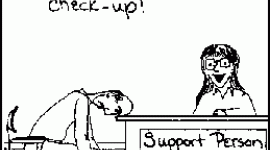Support for Anxiety Sufferers
Page Contents:
- We Are All Connected
- Providing Support
- Helping The Patient With Homework
- Special Concerns of Older Patients
We Are All Connected
 Illnesses happen to individuals, but one person's disease can take a toll on everyone in the patient's life. If one member of the family becomes sick, the routine of the entire household can be disrupted. If the illness is short-lived, the family can return to its normal activities quickly and without lasting impact. But a chronic illness or one that is disabling permanently may affect the way family members interact with one another and with the world.
Illnesses happen to individuals, but one person's disease can take a toll on everyone in the patient's life. If one member of the family becomes sick, the routine of the entire household can be disrupted. If the illness is short-lived, the family can return to its normal activities quickly and without lasting impact. But a chronic illness or one that is disabling permanently may affect the way family members interact with one another and with the world.
Anxiety disorders can be as disruptive as physical ailments, sometimes more so. Many normal family activities may become difficult or impossible. Economic loss may occur if the anxiety disorder limits a person's ability to work. Anxiety disorders may exact a significant emotional toll on all members of the family because the individual with the disorder may be reluctant to participate in typical social activities.
Relationships can be further complicated by the failure of family members to honestly confront the existence of an anxiety disorder. Individuals with a phobia or obsessive-compulsive disorder (OCD) may be too ashamed or embarrassed to ask for help. They may try to hide their anxieties and, at the same time, expect members of the household to be sensitive to their needs and concerns.
Providing Support
The family can play a major supporting role in combating one member's anxiety disorder. Although ultimate responsibility lies with the patient, family members can help by taking part in the treatment program. With training they can accompany the patient into anxiety-producing situations, offer support and encouragement, and create an environment that promotes healing. Family members should:
- recognize and praise small accomplishments
- modify expectations during stressful periods
- measure progress on the basis of individual improvement, not against some absolute standard
- be flexible and try to maintain a normal routine
Family members often can play an active role in anxiety disorder treatment. The precise nature of the assistance will vary depending on the disorder and the family member's relationship with the patient. In addition to providing psychological therapy and medication, mental health professionals increasingly are recommending treatment programs that include family members. As a rule, the more severe the disorder the more likely that family and/or marital issues will need to be addressed by the therapy program.
In one common approach to family therapy, mental health professionals enlist a spouse or other family member as a co-therapist. Making the family member part of the treatment team tends to reduce the possibility of tension concerning the therapy program. Reading educational materials also promotes understanding.
Helping The Patient With Homework
Family members can play an extremely valuable and supportive role by assisting the patient in "homework" that has been agreed upon in consultation with the therapist. Most typically, at-home assignments for patients with phobias involve controlled exposure to situations that trigger anxiety. Exposure therapy works by gradually bringing patients into contact with a feared object or situation to teach them that they can face their anxieties without harm.
Achievement and progress, no matter how small, should be acknowledged. The patient, using anxiety reduction techniques taught by the therapist, should be encouraged to remain in the situation even when anxiety increases. But the patient should not be forced or humiliated into staying.
All goals and rewards should be clearly spelled out and agreed upon before the home practice sessions get underway.
Families and patients must recognize that the recovery process can itself become a source of tension by changing existing relationships. Patients' emotional needs may change during treatment. They may become more assertive or independent. Working through such changes will require patience and understanding by all members of the family, but they should ultimately lead to more stable and more satisfactory lives for all.
Special Concerns of Older Patients
Diagnosis of an anxiety disorder can be difficult at any age, but particularly in the elderly patient. Many of the signs of an anxiety disorder are identical to the symptoms of illnesses common in older people. And some anxiety disorder symptoms may also mimic side effects of medication. Compounding this is the fact that, for a variety of reasons, older people tend to avoid treatment by mental health professionals.
Mental health specialists report success in treating elderly patients.
Medications have proven effective in reducing or eliminating many of the symptoms of anxiety disorders and tend to be many therapists' treatment of choice for the elderly. But there are several unique considerations that must be weighed when prescribing drugs for older patients.
For example, metabolism, liver and kidney function, and the working of the central nervous system decline with age. Physicians also must take into account the patient's ability to remember to take medication, and other drugs they may be taking. Some doctors insist that another member of the household take responsibility for monitoring the elderly patient's adherence to the medication schedule and any adverse reaction to the drug.
next: The Importance of Breathing Through Your Nose
~ all articles on anxiety self-help
~ anxiety-panic library articles
~ all anxiety disorders articles
APA Reference
Staff, H.
(2007, February 19). Support for Anxiety Sufferers, HealthyPlace. Retrieved
on 2026, March 2 from https://www.healthyplace.com/anxiety-panic/articles/support-for-anxiety-sufferers



